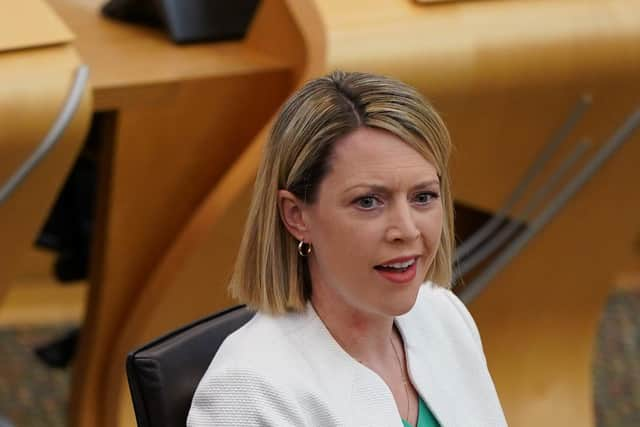Analysis: SNP minister Jenny Gilruth is accused of breaking ministerial code. But what do the rules say?
Humza Yousaf has said he will investigate claims Jenny Gilruth broke the ministerial code – but he has also made clear he thinks she did nothing wrong.
The Scottish Conservatives have accused Ms Gilruth, who is now the Education Secretary, of a “clear-cut, sackable offence” when she was transport minister.
Advertisement
Hide AdAdvertisement
Hide AdThe row centres on her decision to delay proposed rail electrification work that would have caused eight days of disruption across Fife and central Scotland from Boxing Day last year. Ms Gilruth represents Mid Fife and Glenrothes, and the allegation is that she gave “preferential treatment” to her constituents.


The First Minister said these are “very serious accusations indeed” and there will be an “appropriate investigation”. However, he also said the decision was made for the “correct reasons”.
Speaking to journalists after First Minister’s Questions in Holyrood, he was even more explicit: "I will look into the detail of it. From information I have in front of me, it does not look like there has been a breach. I can see perfectly legitimate reasons why Jenny Gilruth made the decisions she made at the time.”
This has led to concerns from Douglas Ross, the Scottish Tory leader, that Mr Yousaf “has already prejudged the outcome of the investigation he’s agreed to hold”.
But what does the ministerial code say, and what is the process for investigating alleged breaches?
The code – which sets out how ministers should behave – is clear that “where ministers have to take decisions within their area of portfolio responsibility which might have an impact on their own constituency or region, they must take particular care to avoid any possible conflict of interest”. It adds: “They should advise the Permanent Secretary and, in the case of junior Scottish ministers, the relevant Cabinet Secretary of the interest, and responsibilities should be arranged to avoid any conflict of interest.”
Mr Yousaf said the original rail works “would have caused significant disruption right across the whole east coast of Scotland”, including for passengers in Dundee, Perth and Aberdeen – in other words, it would not simply have affected Ms Gilruth’s constituency. He said the minister had “rightly” asked for a postponement.
Crucially, as the code makes clear, it is Mr Yousaf who makes the final decision. “Ministers are personally responsible for deciding how to act and conduct themselves in the light of the ministerial code and for justifying their actions to Parliament and the public,” it says. “The First Minister is, however, the ultimate judge of the standards of behaviour expected of a minister and of the appropriate consequences of a breach of those standards. Although the First Minister will not expect to comment on every matter which could conceivably be brought to his or her attention, ministers can only remain in office for so long as they retain the First Minister’s confidence.”
Advertisement
Hide AdAdvertisement
Hide AdThe document does leave open the possibility of outside advice, however. “Where he or she deems it appropriate, the First Minister may refer matters to the independent advisers on the ministerial code to provide him or her with advice on which to base his or her judgement about any action required in respect of ministerial conduct,” it says. “The findings of the independent advisers will be published.”
Comments
Want to join the conversation? Please or to comment on this article.
